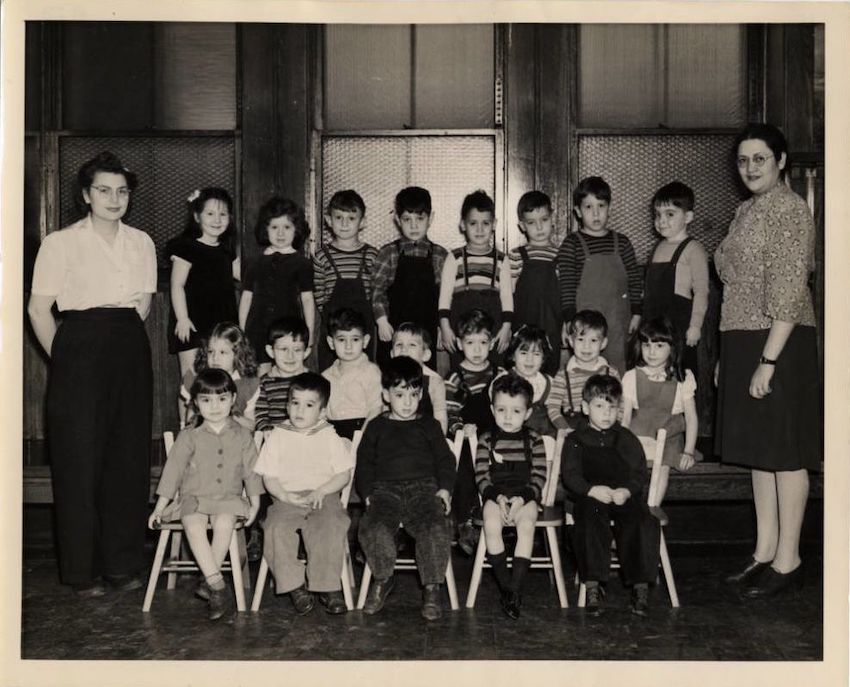Your Daily Phil: Israel lifts quarantine requirement on Birthright + ‘Hebrew School’ 101
Good Friday morning!
Ed. note: In honor of Labor Day and Rosh Hashanah, the next Your Daily Phil will arrive on Thursday, September 9. Wishing you a happy and healthy New Year!
The Greater Miami Jewish Federation is leading the disbursement of $3.5 million in funds to victims of the Surfside condominium tower collapse, federation CEO Jacob Solomon told eJewishPhilanthropy. Flaws in the tower’s design and construction caused it to fall on June 24, killing 98 people.
The federation’s fund includes $2.5 million raised by the federation and $1 million raised by The Shul, the popular Chabad synagogue in nearby Bal Harbour, and Hatzolah of South Florida, the emergency response service, Solomon said. The funds, $700,000 of which have already been disbursed to 140 individuals or families, are being distributed according to the needs of the victims.
While funds are being disbursed to people regardless of religion, a third of the victims of the tower collapse were Jewish, and tended to be highly connected to the community and traditional in their observance, Solomon said.
“There’s no question that holiday time is very painful for people who have recently experienced loss, but I guarantee you that everyone who wants to be hosted for a meal will have more than enough offers to keep them well-fed and in loving comfort for the duration of the holidays,” Solomon said.
EXPLAINED BY EJP
‘Hebrew School’ 101: The history and future of supplementary Jewish education


George Kaplan Hebrew Seminary Pre-School class, St. Paul, 1945
A recent study of Jewish education from the Collaborative for Applied Studies in Jewish Education (CASJE) found a staffing shortage in the sector that educates the largest number of Jewish children — those who attend public or non-Jewish schools and learn about Jewish practice, culture and history in synagogues or other settings. The shortage likely stems from a distorted “folklore of failure” that pervades the communal conversation about this sector that requires fresh thinking, Miriam Heller Stern, director of the school of education at Hebrew Union College-Jewish Institute of Religion, told eJewishPhilanthropy’s Helen Chernikoff.
How many Jewish children actually receive their education in these schools?
Nobody knows, said both Arielle Levites, CASJE’s managing director, and Rabbi Jennifer Goldsmith, the managing director of congregational learning and leadership initiatives at The Jewish Education Project. A study conducted by Jack Wertheimer for the Avi Chai Foundation in 2006-2007, which put the number of students in supplementary schools at 230,000, offers the most recent official numbers, Goldsmith said. The Avi Chai study included only synagogue schools, and no alternative models such as the outdoor program provided by the “Adventure Rabbi” in Boulder, Colo. By contrast, in the 2018-2019 school year, there were about 292,000 students in day schools and yeshivas, also according to Avi Chai. In October and November, The Jewish Education Project will conduct a new study on this subject, with data available in 2022, Goldsmith said.
Are these the schools that used to be called “Hebrew Schools?”
Yes. That term first gained currency because teachers ideologically committed to the revival of spoken Hebrew dominated part-time Jewish education in the early 20th century, according to a CASJEreport, “Let’s Stop Calling It Hebrew School,” by Netta Avineri, Sarah Bunin Benor and Rabbi Nicki Greninger. However, students attended those schools as many as 12 hours a week, and those hours decreased as Jewish families moved to the suburbs and began to offer their children a wider array of afterschool activities. The expression is used today because many schools still focus on the acquisition of the Hebrew alphabet, but not an understanding of the language, in order to prepare for a bar or bat mitzvah, Avineri, Bunin Benor and Greninger found. However, they are also called synagogue schools, religious schools and congregational schools. Researchers such as Wertheimer and those at CASJE use the broadest term — “supplementary schools.”
Where does the “folklore of failure” come from?
Whether or not the school is called “Hebrew School,” many parents have unrealistic expectations about how much Hebrew their children can learn in their limited time in the supplementary school classroom, Stern said. Others aren’t quite sure what they want from supplementary school. The administrators and educators need to help parents answer this question for themselves, Stern said, noting that she trains her graduate students in how to have these conversations. “The Jewish community has not taken enough time to engage parents about what they want.”
REBOOKING
Birthright receives Health Ministry approval to resume trips to Israel


Nicolas Economou/NurPhoto via Getty Images
Birthright Israel has received approval from Israel’s Health Ministry to resume trips to the country, Jewish Insider’s Tamara Zieve reports. The popular 10-day tours of Israel, which bring thousands of young Jewish adults from around the world to the country every year, were halted in August due to new restrictions put in place to curb the latest wave of COVID-19 in the country. The measures, which went into effect last month as the Delta variant of the virus spread, barred quarantine-free entry to the country to individuals from a number of countries, including the United States.
Swift and safe return: Hundreds of young adults who were supposed to travel to Israel with Birthright in recent weeks had their trips canceled. “We received an approval and we hope to resume trips in a safe way for vaccinated Jewish young adults soon,” a spokesperson for Birthright told JI.
Priority status: The Birthright Israel website assures those whose trips were canceled that they will receive priority status for a future trip.
Vaccinated only: The Health Ministry confirmed to JI that it had issued approval for “Birthright Israel delegations to come for educational activities in Israel, due to the value and educational importance of the trip.” The ministry’s statement to JI stressed that entry into the country “is conditional on the participants being vaccinated and conducting a COVID-19 test upon arrival in the country.” It added that the groups will be allowed into Israel after the High Holidays.
WHITE PAPER
How Critical Social Justice ideology fuels antisemitism


Shutterstock
“The Jewish Institute for Liberal Values released a white paper on how Critical Social Justice (CSJ) ideology fuels antisemitism on the left. CSJ, which encompasses Critical Race Theory and other theoretical perspectives (and is sometimes colloquially referred to as “wokeness” or “wokism”) is a specific approach to addressing issues of discrimination due to race, sex, or other specific characteristics through the examination of power and privilege,” writes David Bernstein, founder and director of the Institute, in an opinion piece for eJewishPhilanthropy.
Ideology: “The paper argues that because of the binary nature of the ideology, which holds that those who are presumed to be powerful are the cause of suffering of those who are presumed to be powerless, CSJ ideology often fuels antisemitism. Even though many of those who advance the ideology do not intend to promulgate antisemitic ideas, the rapid proliferation of this ideology portends an increase in the world’s oldest hatred.”
Jewish privilege: “The white paper identifies seven ways in which CSJ ideology contributes to the rise of antisemitism. First, CSJ fuels the canard of Jewish privilege. Antisemites have always promoted the canard that Jews secretly control the levers of power. CSJ invites such antisemitic imagery by positing a fixed hierarchy of privilege, which legitimizes notions of ‘Jewish privilege.’ This portrayal of Jews represents Jews as a self-contained cabal or lobby and doesn’t take into account the innumerable differences within the Jewish community.”
PANDEMIC SAFE
A rabbi on the High Holy Days


eJP Archives
“Packing the drive-in movie theater with over 200 cars on Yom Kippur, the Cantor and I conducted services last year, from, of all places, the rooftop of a snack shack,” writes Rabbi Alex Lazarus-Klein of Congregation Shir Shalom in Buffalo, N.Y., in an opinion piece for eJewishPhilanthropy.
Pandemic safe: “And, this was only one of dozens of creative fixes that our congregation employed to have a ‘pandemic’ safe and meaningful High Holy Days. By thinking outside of the box, we were able to not only approximate the experience we would have had pre-COVID, but improve upon it as well.”
Focus on the essential: “We looked at each component of the High Holy Day experience on its own merit, and tried to find an individual response to it. Some of our other creative solutions included around-the-town shofar-blowing sessions, High Holy Day gift bags, Zoom schmoozathons, virtual choir performance, and Yom Kippur break-the-fast boxes.”
“Have a multifaceted multi-platform approach: “Many communities chose one technological platform and stuck with it. We did not. Zoom, streaming, in-person, all have their strengths and weaknesses. Sticking with one is easier, but you risk getting Zoom or stream fatigue, or worse complete technological breakdown. To counter this, we used every technique at our disposal, but only for limited amounts of time, dividing the services up into approximately one-third Zoom, one-third stream and one-third in-person.”
Worthy Reads
Wish List: The Root highlights the philanthropy of 10 Black female philanthropists in an annual list compiled in partnership with the Women’s Philanthropy Institute, Black Philanthropy Month and The Women Invested to Save Earth Fund. The list includes Felicia Davis of Chicago, who is president and CEO of Chicago Foundation for Women and co-founder of the South Side Giving Circle; Valaida D. Fullwood of Charlotte, N.C., the author of Giving Black, which profiles Black philanthropists; and Sharlene Kemler of Brooklyn, a philanthropy consultant and a therapist who does pro bono work with Black women and girls. [Root]
Added Benefits: While nonprofit organizations are increasingly using SMS text messaging to solicit donations, they shouldn’t overlook its potential to help collect data, manage events and mobilize volunteers and other supporters, writes Matt Baglia in Nonprofit PRO. Professionals who decide to use text messaging more frequently should be careful to create a calendar, however, lest they overwhelm their donors with messages. “While nonprofits might initially use text message marketing to solicit and raise funds, it’s a strategy with flexibility,” Baglia concludes. [NonprofitPRO]
Small Change: Coronavirus lockdowns have caused people in the U.K. to hold onto loose change longer than normal, spurring calls for the money to be given to charity to offset a dip in donations during the pandemic, reports Kevin Peachey in the BBC. Experts estimate that as much as £50 million, or $70 million, is being hoarded, which is also forcing the government to spend on the minting of more coins to replace those removed from the economy as they sit in people’s homes. ??”Industry and policymakers may need to actively encourage greater recycling of hoarded cash to avoid significant wastage to the UK economy,” a UK Finance report on the issue said. [BBC]
Community Comms
Be featured: Email us to inform the eJP readership of your upcoming event, job opening, or other communication.
Word on the Street
The Jewish People Policy Institute released its 2021 Annual Assessment… Boston College received a $75 million gift from Joyce L. and E. Paul Robsham, the largest estate gift in the university’s history, in support of financial aid, academic programming, facilities improvements and the Robsham Theater Arts Center… The Denver Art Museum is poised to receive a $25 million endowment gift from an anonymous donor to establish an Institute of Textile Art and Fashion… The Open Society Foundations is providing $2.5 million in emergency relief for Haiti in the aftermath of the August 14th earthquake…
Pic of the Day


Courtesy
With no electricity and widespread damage in Metairie, La., following Hurricane Ida, Chabad emissaries made a barbecue and gave away their remaining perishables.
Birthdays


Amnon Rubinstein (Photo by © David Rubinger/CORBIS/Corbis via Getty Images)
Long-time former member of Knesset, he is a law professor at the Interdisciplinary Center in Herzliya, Amnon Rubinstein celebrates on Sunday…
FRIDAY: Past chair of the Anti-Defamation League and the Conference of Presidents of Major American Jewish Organizations, Robert Sugarman… Media personality known as Dr. Estella, Estella Sneider, Psy.D…. Software engineer at IBM in Cary, NC, in 2008 he located and interred the remains of the crew of a crashed WW2 American B-24 in the Indian Himalayans, Gary Zaetz… Actor best known for portraying Bobby Baccalieri on The Sopranos, Steve Schirripa… Senior advisor at Guggenheim Partners, Jonathan Silver… Producer and reporter at NBC and MSNBC, Adam Reiss… Editor-in-chief and CEO of Time Magazine, Edward Felsenthal… Author and journalist, Eric S. “Rick” Perlstein… Mayor of Haifa, the first woman to lead the city, Einat Kalisch-Rotem… Executive director of the Sarnoff Center for Jewish Genetics at Chicago’s Jewish United Fund, Jason Rothstein… Visual editor for The Wall Street Journal, Todd Lindeman. CEO of PR and communications firm Sunshine Sachs, Shawn Sachs… Founder of the Silverstein Group, Rustin Silverstein… Rabbi of The Hampton Synagogue, Avraham Bronstein… Chief advancement officer of Honeymoon Israel, Avital Ingber… Public affairs official at Facebook, Joel Martín Kliksberg… Chief media correspondent for CNN, Brian Stelter… South Florida-based attorney and co-chair of JFNA’s national young leadership cabinet, Lindsey Tania Glantz.. Fashion model and actress, Kaia Jordan Gerber…
SATURDAY: Award winning computer scientist and philosopher who is a pioneer in artificial intelligence, he is the father of slain WSJ journalist Daniel Pearl, Judea Pearl… Emeritus professor of law and former acting dean at the Benjamin N. Cardozo School of Law, Lester Brickman… Retired professor at the University of Puerto Rico School of Medicine, Edmundo N. Kraiselburd, Ph.D…. Political consultant who has served as board president of Louisville, Kentucky’s Jewish Family & Career Services, Mark Steven Ament… Celebrity doctor known as “Dr. Drew,” David Drew Pinsky, M.D…. Former Congressman Anthony Weiner… Real estate advisor, E. O’Brien “Obi” Murray… Screenwriter Barry Louis Levy… Former member of Knesset and Deputy Speaker of the Knesset, Yehiel “Hilik” Bar … General partner of Thrive Capital, Jared Weinstein… Television and film actor, Max Greenfield… Development officer at Atlanta’s Jewish Home Life Communities, Melissa Horen Kaplan… Television and film actor, Carter Mark Jenkins…
SUNDAY: Former Judge on the U.S. Court of Appeals for the Third Circuit, Judge Dolores Korman Sloviter… Author, educator, and activist, Jonathan Kozol… Front end web developer, Catherine Nelson… Rabbi of Congregation Rinat Yisrael in Teaneck, New Jersey and Rosh Yeshiva of the Torah Academy of Bergen County, Rabbi Yosef Adler… Judge of the Wisconsin Court of Appeals, JoAnne Fishman Kloppenburg… Principal at Watershed Associates, Stuart Shlossman… New York-based real estate developer, Jacob Frydman… Russian investigative journalist, Yevgenia Albats… Member of the Knesset serving as the Economy Minister, she is a retired Major General in the IDF, Orna Barbivai… Chairman of the board of Investment Canada and past chairman of Cirque du Soleil, Mitch Garber… Nationally syndicated newspaper columnist, Jacob Z. Sullum… Chairman of Mentored, Eric Aroesty… DC-based freelance reporter, Holly Rosenkrantz… Member of the Knesset for the Yisrael Beiteinu party, Yulia Malinovsky… Staffing analyst at Apex Global Solutions, Jeremy C. Frankel… Director in the DC office of Baron Public Affairs LLC, Jeremy Furchtgott… Product marketing manager at CrossBorder Solutions, Anthony Klor…
Email Editor@eJewishPhilanthropy.com to have your birthday included.








